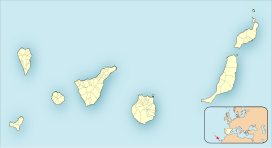Roque de Agando
| Roque de Agando | |
|---|---|
 | |
| Highest point | |
| Elevation | 1,250 m (4,100 ft) |
| Prominence | 180 m (590 ft) |
| Coordinates | 28°06′19″N 17°12′49″W / 28.1052923°N 17.2137276°W |
| Geography | |
| Location | La Gomera, Canary Islands, Spain |
Roque de Agando (commonly called Roque Agando) is a prominent rock formation on the island of La Gomera in the Canary Islands.[1] It is one of La Gomera's most striking features and is frequently used as a symbol for the island.
Roque Agando is the most prominent of a group of volcanic plugs called simply Los Roques, near the centre of the island.[2] The others are named Roque Ojila and Roque Zarcita, and sometimes Roque Carmona and Roque Las Lajas are also included.[3] It rises directly above the main road between the island's capital San Sebastián and Garajonay National Park in the centre, which makes it a popular tourist sight.
The summit is not accessible by foot. During the 20th century, some easy rock-climbing routes were established on the peak, but climbing is now banned there, and hiking is restricted to established paths in its vicinity, as it forms part of a protected area.[4]
Remains of the indigenous Guanche sacrificial shrines have been found on the summit. These were in good condition until the 1980s, when they were looted by a German group making a documentary film.[5]
References
[edit]- ^ "Monumento Natural de los Roques: Documento Informativo" (PDF). Canaries Government. Archived from the original (PDF) on 2012-06-05. Retrieved 2011-10-04.
- ^ Carracedo, J. C. (Juan Carlos). The geology of the Canary Islands. Troll, V. R. Amsterdam, Netherlands. ISBN 978-0-12-809664-2. OCLC 951031503.
- ^ Tim Hart (2004), La Gomera: A Guide, Colley Books, p. 37, ISBN 0-9547989-0-2
- ^ "Los Roques". summitpost.org. Retrieved 2011-10-04.
- ^ Documento Informativo, p. 51


 French
French Deutsch
Deutsch